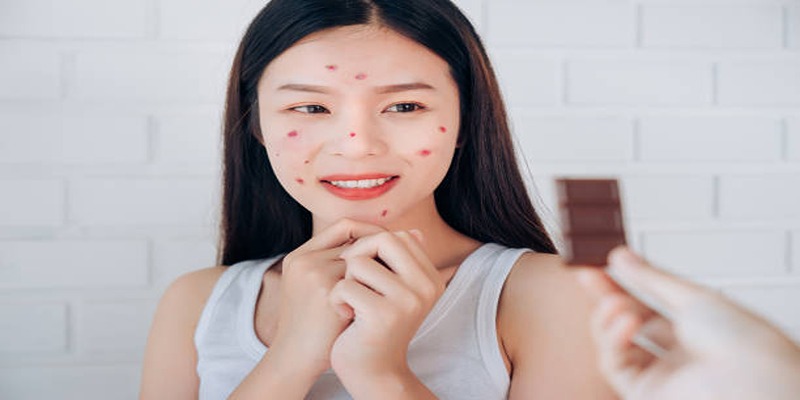Chocolate is a beloved treat enjoyed by many people around the world. However, there has been a longstanding debate about whether eating chocolate can lead to acne. Some people believe that consuming chocolate can cause skin breakouts, while others think it's just a myth. This guide aims to explore the possible connection between chocolate and acne, examining scientific studies and expert opinions. By looking closely at the ingredients in chocolate and how they may affect the skin, we can better understand this common concern and hopefully answer the question of whether chocolate truly impacts acne.
What is acne?

Acne refers to a skin ailment, which is experienced by a large number of people all over the world. It happens when the hair follicles on the face, neck, chest and back are plugged with oil, dead skin, and bacteria, which results in red swells, black dots, and white dots. As with other skin condition, acne is known to be caused by factors including hormones, genetic factors, and diet among others.
Factors affecting acne development
While it is widely known that hormones and genetics play a significant role in acne development, the impact of diet on skin health is still being studied. Some studies have shown that high glycemic index foods like processed sugars can worsen acne, while other research has suggested a link between dairy products and breakouts. However, the effects of specific food items, such as chocolate, are less clear.
The ingredients in chocolate
To analyse the effects that chocolate may have on acne, lets consider the content of this product. By processing the beans from cocoa, chocolate contains flavonoids and antioxidants that research suggests assists in better blood flow and improved brain function. However, chocolate also includes sugar, products containing dairy, and seemingly caffeine as well.
Sugar
Sugar is often singled out as a possible culprit for causing breakouts. High levels of blood sugar can lead to an increase in insulin production, which may result in increased sebum (skin oil) production and inflammation both of which are associated with acne.
Dairy Products
Milk is another ingredient commonly found in chocolate. Some studies have suggested that dairy products, particularly skim milk, may worsen acne. However, more research is needed to confirm this link.
Caffeine
Chocolate contains low levels of caffeine, which can have various effects on the body, including increasing blood pressure and stimulating the production of stress hormones. While there is no direct evidence linking caffeine to acne breakouts, some people believe that caffeine can indirectly impact skin health by causing stress and disrupting sleep patterns.
The impact of chocolate on acne
Despite the possible negative effects of sugar and dairy in chocolate, there is still no clear connection between consuming chocolate and developing acne. Many experts suggest that moderation is key when it comes to chocolate consumption. Eating excessive amounts of high-sugar, high-fat chocolate could potentially lead to an increase in insulin levels and inflammation, which may aggravate acne. However, occasional indulgence in dark chocolate which contains less sugar and dairy may not have a significant impact on skin health.
The role of individual factors
It's essential to remember that everyone's body reacts differently to different foods. While some people may notice a connection between consuming chocolate and developing acne, others may not experience any changes. Additionally, other factors such as genetics and hormones can also play a more significant role in acne development than diet alone.
Scientific Studies and Evidence
In recent years, several studies have been conducted to investigate the possible link between chocolate consumption and acne breakouts. A study published in the Journal of Clinical and Aesthetic Dermatology found no significant association between chocolate consumption and acne in young adults. Another study published in The American Academy of Dermatology also showed no evidence that eating chocolate leads to an increase in acne.
While these studies suggest that there is no direct correlation between consuming chocolate and developing acne, it's important to note that they do not rule out the possibility of individual sensitivity or other factors at play.
Foods That Could Contribute to Acne
Although the link between chocolate and acne remains inconclusive, there are certain foods that have been linked to an increase in breakouts.
High Glycemic Index Foods
Foods with a high glycemic index (GI), like white bread, pasta, and sugary drinks, are known to elevate blood sugar and insulin levels. This surge in insulin can trigger excess sebum production and inflammation, both linked to acne development.
Dairy Products
Several studies have indicated a possible connection between dairy consumption and acne breakouts. Although further research is required to confirm this link, individuals with acne-prone skin might find it advantageous to reduce their intake of dairy products.
Fried and Greasy Foods
Foods high in unhealthy fats, such as fried and greasy foods, have been shown to contribute to inflammation in the body. This can potentially worsen existing acne or trigger breakouts.
Why I feel breakouts after eating chocolate?

If you have noticed a correlation between consuming chocolate and experiencing breakouts, it could be due to individual factors. For example, if your body is sensitive to high-glycemic-index foods or dairy products, indulging in these ingredients found in chocolate may lead to an increase in acne. Additionally, if you have hormonal imbalances or genetics that make you more prone to developing acne, consuming large amounts of sugar and unhealthy fats can potentially worsen your skin condition.
Conclusion
While the debate on the connection between chocolate and acne continues, it's essential to remember that moderation is key when it comes to diet and skin health. If you notice a correlation between consuming certain foods, such as chocolate, and breakouts, it may be helpful to limit your intake and focus on incorporating more nutrient-dense options into your diet. Additionally, consulting with a dermatologist can help identify any individual sensitivities or underlying factors that may contribute to acne development. Maintaining a balanced and healthy diet is crucial for promoting overall skin health. So next time you indulge in some chocolate, enjoy it in moderation and remember there's no clear evidence that it directly causes acne breakouts!







